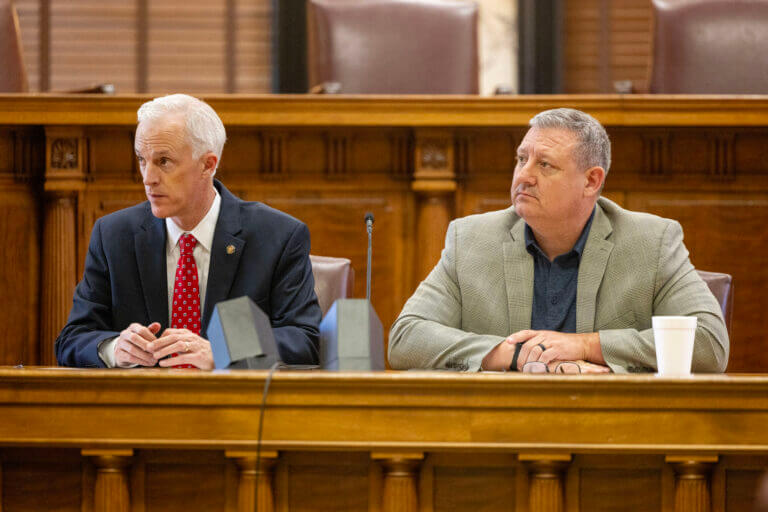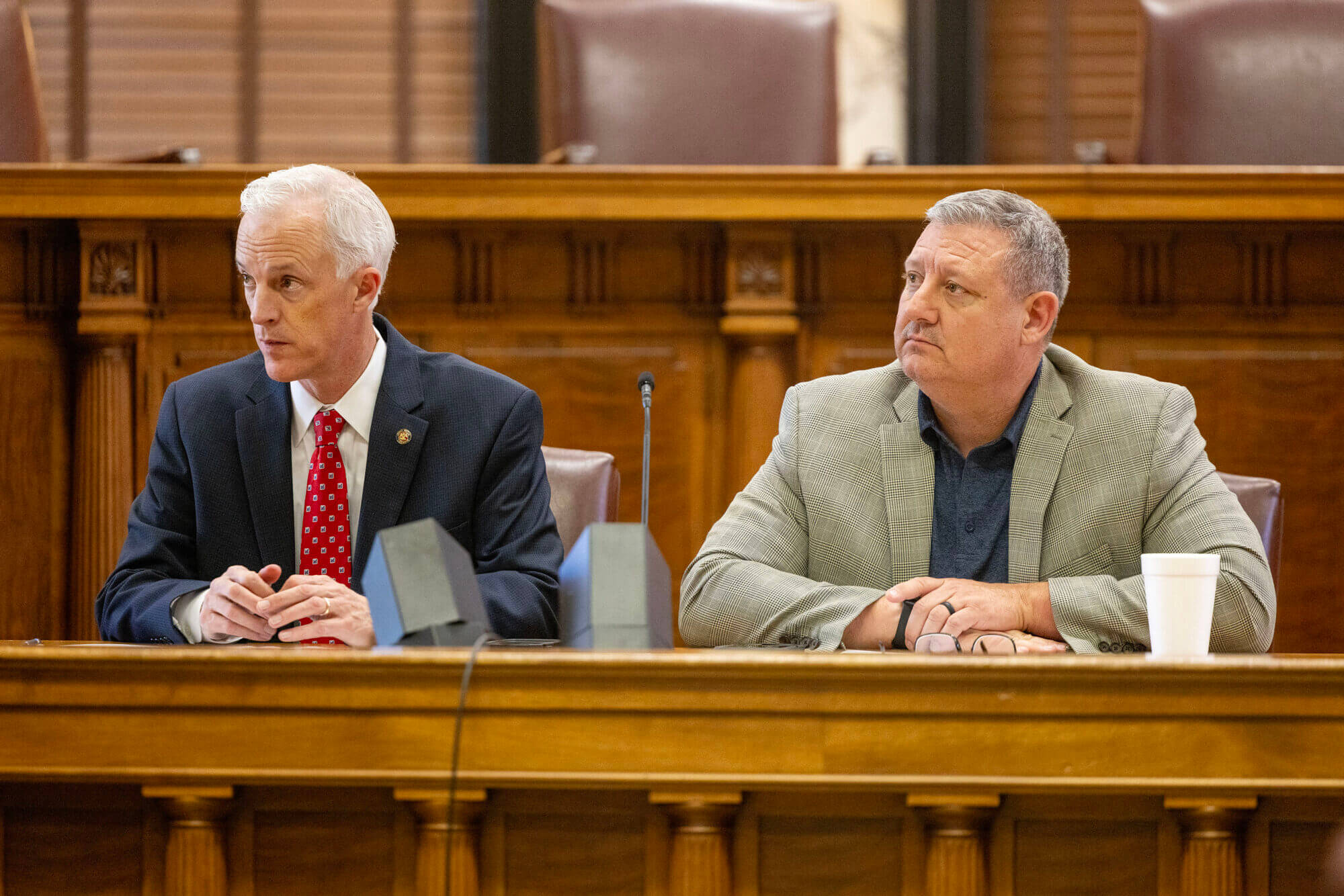

While the school-choice debate continues to simmer in the Mississippi House, the Senate Education Committee is focusing on raising teacher pay and combatting chronic student absenteeism.
The Senate panel on Tuesday heard from a charter school researcher and others during a seven-hour meeting, the committee’s second hearing this month. The hearing also centered around the challenges facing traditional public schools — which superintendents said would only get worse if “school choice” is expanded in Mississippi.
“School choice” refers to a number of policies that give parents more educational options outside of traditional public schools, including private schools, often funding those opportunities with taxpayer dollars. House leaders have vowed it’ll be the key issue of the 2026 legislative session and are already working on a draft bill.
That bill could spell disaster for Mississippi schools, the four superintendents warned the Senate committee.
The school leaders from Oxford, Jackson, Greene County and Scott County said they feared school choice would siphon money and resources away from traditional public schools. Instead, they asked lawmakers to consider investing in the state’s existing education system by continuing to support early education, career and technical education opportunities and student mental-health resources.
“On the surface, it does sound like a good idea to give families dollars to choose the school their child should attend,” said Superintendent Bradley Roberson from Oxford. “But if we look at it, it’s not that appealing for families across our state.”
Last week, the executive director of the regional private school association told lawmakers on the House committee selected to study school-choice policies that private schools were not willing to support school choice unless the dollars came with no strings attached. He said private schools under no circumstances would make their students take state tests or change their curriculum, regardless of whether they received state funds.
Roberson said that’s what sets traditional public schools apart.
“I can assure you public schools aren’t afraid of competition, but I do want to hit on something about competition,” he said. “True competition only exists when everyone plays by the same rules. Our private school friends have made it clear they have no interest in doing that. And why would they? They get to choose the students they serve.
“We open our doors to every child every day regardless of background, income, ability, or circumstance. And y’all, that’s not a weakness … That’s a promise,” he said.
The superintendents lauded the hard work of their teachers and students that’s led to the state’s academic turnaround in recent years, and questioned why lawmakers would threaten to disrupt their progress.
Increasing teacher pay emerged as a top issue during the meeting.
Roberson reminded lawmakers that many of Mississippi districts that struggle academically also struggle to recruit and retain certified teachers. Both Alan Lumpkin from Scott County and Charles Breland from Greene County told lawmakers about challenges recruiting their own daughters to their school districts because of low salaries.
“If we want to sustain the Mississippi miracle, we have to retain teachers and we have to recruit teachers into this profession, and the current salary is not recruiting teachers into the profession,” Lumpkins said. “That’s the struggle that we’re having. I’m having it with my own daughter who wants to be a teacher one day, but she also wants to be able to provide things for her children and her future family.”
Their accounts lined up with data presented by Megan Boren, the Southern Regional Education Board’s director of educator workforce policy.
Mississippi’s teacher pay is among the lowest in the nation, according to SREB data. The state trails its neighbors in average top salary, average salary and starting salary, and generally sits thousands below national averages in those categories.
Another challenge unanimous across schools: chronic absenteeism. Boren encouraged school leaders to build a positive culture at school to incentivize attendance and build relationships with families to establish community-wide the importance of consistently going to school.
Boren said interest in teaching among high school students in the South is down to an average of 4%, an alarming statistic in a region experiencing major teacher shortages. Boren suggested raising pay, creating a “residency year” for teachers and establishing an “induction” process in which teachers are extensively supported during their first few years in the classroom.
Errick Greene, superintendent of Jackson Public Schools, had a unique point to take up with lawmakers. He said the district was challenged by the local presence of charter schools. The Jackson Public Schools board of education last week voted to deny a local charter’s request to expand into high school grades, but the charter authorizer board said the school doesn’t need JPS approval.
Greene encouraged legislators to take a closer look at charter accountability measures and funding.
“We’re required to cut a lump sum check to charter schools but we don’t get paid in a lump sum,” he said. “We’re paid in increments throughout the year … As you might imagine, given that we’re now at about $12 million in payment annually to charter schools just from our district, that’s a huge hit to our schools.”
Greene’s comments were in stark contrast to remarks given earlier in the day by Lisa Karmacharya, executive director of the Mississippi Charter School Authorizer Board.
Karmacharya, in the meeting’s opening presentation, implored senators to loosen charter school laws to allow the sector to grow and make it easier to establish charter schools across the state. Currently, charter schools can be established in areas where the local school district is rated A, B or C if the district’s board approves, and without board approval in areas rated D or F.
She said current state law has created a charter system parallel to the state’s traditional public school system, and for the two to be successful, they need to work together. Aimee Evan, an education researcher from WestEd, said charter school systems need to be given time to show results.
But several senators were skeptical.
“I question whether this 10-year experiment has worked,” said Sen. David Blount, a Democrat from Jackson and vice-chairman of the education committee. The state’s first charter school was established in 2015.
Sen. Nicole Boyd, R-Oxford, asked Karmacharya why the authorizer board hasn’t closed low-performing charters. Most of Mississippi’s charter schools are failing by the state’s accountability measures, which lawmakers noted are set to get even more rigorous next year. Karmacharya told the panel that her board needs more freedom in legislation to act more quickly to renew and close schools, which Sen. Dennis DeBar, a Republican from Leakesville and chairman of the education committee, said he was happy to consider.
But DeBar left her with a stern warning.
“I am concerned that the charter schools have not progressed to where they need to be … I would like to see more charter schools but it’s hard to justify that when the performance that we have just isn’t up to snuff,” he said. “Hopefully next year when we come back ratings will be better. If they’re not, there need to be drastic changes by the Legislature.”
- Mississippi Explained News Quiz: School choice and prison health care reform appear dead - March 2, 2026
- Two plead guilty to collecting pandemic-related unemployment benefits while in prison - March 2, 2026
- Michael Watson confirms he won’t seek third secretary of state term, hints at higher office - March 2, 2026